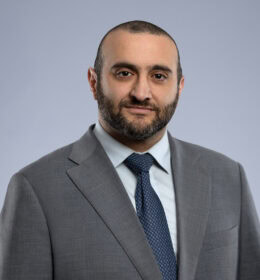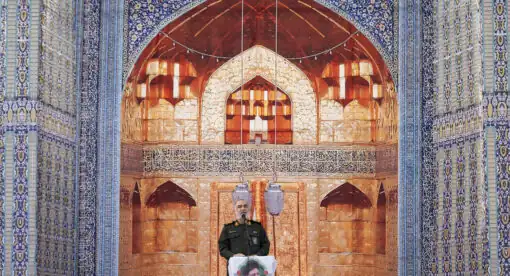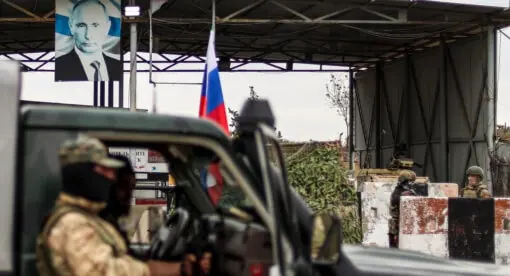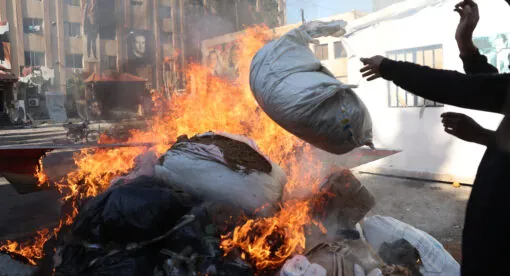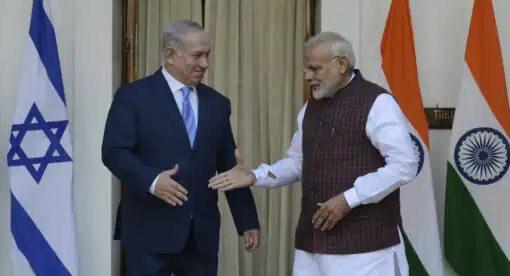The Middle East Center at New Lines Institute for Strategy and Policy is launching a new podcast series, “Lebanese Logic,” hosted by Resident Senior Fellow Faysal Itani. The series focuses on Lebanon’s political dynamics, its important role in the geopolitics of the Middle East, and the future of Hezbollah. In this inaugural episode, Itani and New Lines Institute Senior Director Nicholas A. Heras forecast the direction of Lebanon’s politics and foreign policy in the context of the rapidly shifting regional developments in the Middle East.
Nick Heras: Hello, my name is Nick Heras, and I am the director of The Middle East Center at The New Lines Institute for Strategy and Policy. The Middle East Center is launching a new podcast series, Lebanese Logic, which will be hosted by the Center’s resident senior fellow, Faysal Itani. This inaugural episode of the Lebanese Logic podcast series focuses on Faysal’s forecast on the country’s political dynamics and its foreign policy in the context of the rapidly shifting regional developments in Middle East.
Faysal is a globally recognized expert on Lebanon, the Levant, and Middle East topics. In addition to his position here at The New Lines Institute, Faysal is an adjunct professor at both Georgetown University and the George Washington University, where he teaches Middle East topics. Faysal, welcome. Thank you for joining me for this discussion, and I look forward to hearing the future episodes in the series that you will be hosting.
Faysal, I want to jump right into the conversation here, and I just wanted to ask you, in your analysis, to what extent has the recent conflict between Hezbollah and Israel been an inflection point in Lebanon’s modern history?
Faysal Itani: I think you need to look at it through two angles. On the one hand, there’s the obvious geopolitical and security implications of the war, and that is the weakening of Hezbollah, how others have processed that and reacted to that. Hezbollah, as you know, has been basically the central, although not the only one, but the central political argument, status of Hezbollah, and its future in Lebanon, for the past, I’m going to say, 20 years in Lebanon.
Obviously, Lebanon has many other problems than this, but this has been the point of contention. In addition to the shifting balance of power between Israel and Hezbollah, it gets at the heart of the issue that Lebanese have been wrestling with for a long time. Now, the question has come up for the Lebanese of what to do about this party and its future.
That’s as big an inflection point as the entry of Palestinian militant groups into the country in the late ’60s, and the way it turned Lebanese politics upside down. That is a major historical inflection point for sure. The other thing is that– in short … we can expand on that, of course. The other inflection point is to do with Lebanese politics internally, because this has happened to overlap, coincide, and connect with the question of how Lebanon should be governed and what should be done about this vast array of challenges facing the country.
Interestingly, in the wake of this war, and partly because of this war, we’ve had the election of a slightly different kind of Cabinet in Lebanon, historically speaking. Now, whether or not that is an inflection point or not, that remains to be seen. But it’s a very interesting twist, and it’s all tied up with the geopolitics and the security situation and the war with Israel. There’s a lot going on at the same time.
Nick: I want to pick up on this thread, Faysal. You make a very interesting point about the internal dynamics in Lebanon. I want to ask you, from your analysis, how are the various different communities in Lebanon positioning themselves in this period where there’s a lot of question as to the extent to which Iran or Hezbollah, and whether or not Hezbollah, with its severely damaged command and capabilities, is able to be anything more than just a local militia?
Faysal: That’s an excellent question. The answer is as complicated as the political field, so to speak, in Lebanon. You have more or less roughly three camps in which Lebanese actors are situating themselves. One of them is the predictable camp of, “Hezbollah may have taken a hit, but no one touches Hezbollah’s arms. To provoke Hezbollah at this time is to provoke war.” Hezbollah, even if it took a bit of a hit in the war, is not going anywhere.
It’s a position of refusal and stubbornness and threat, all in one go. That’s Hezbollah itself, its messaging that, of course. Hezbollah has partners and allies in Lebanon, too, it’s not alone, even if it took a big hit last summer. Those are circling the wagons around this position as well, that you may think that this is the time to go after Hezbollah, but actually, you’re absolutely wrong. This is the worst possible time you can pressure us. If you do it, we will take it as you basically riding on the back of an Israeli tank and getting Hezbollah out of Lebanon using the Israelis. That’s position No. 1.
It’s hard to see what the actual calculation of people in that camp are, how far they will take violence, what their red lines are, but you know this is the positioning. That’s all we really know at the moment. This is a picture that’s further complicated by the fact that we don’t know a huge deal about how the popular base of this movement feels, obviously mostly Shia in Lebanon. We don’t know how they feel about the war, how they feel towards the party and its conduct, how they feel about their position in the sectarian political system.
That’s an important part of the equation, and presumably, Hezbollah knows this better than I do. I can’t comment too much on it, but I will say that’s the party’s position. Then you have the other screen, the other side of the spectrum, which are Lebanese groups and factions. I think, in Lebanese forces, probably under Samir Geagea, is a good example of this, or it’s not the only one, that seen the war both as proof of concept, proof that basically Hezbollah needs to disarm, as well as an opportunity to disarm Hezbollah.
Their position on this issue has been to pressure the institutions and the government of the country to just basically squeeze Hezbollah as hard as possible, and to try to rally international support behind that campaign as well. That intersects and interacts in complicated ways with the current government administration. We can talk about that, I think it’s a slightly separate matter, but that’s what that faction’s position was, is, “This is a historic opportunity, let’s go after Hezbollah with all we’ve got.”
As for the country’s other problems– well, first, as for the potential backlash, that would only hurt Hezbollah more, so don’t worry about it. As for the other problems in the country, it’s more or less, “Yes we have problems, but unless you solve this problem, nothing else matters. Nothing else is solvable without Hezbollah being solved.”
Then you have, finally, the third faction, I would say, and these people are — there’s no good word for it. They’re not moderates because it doesn’t really make any sense in this context, but I think maybe they’re more pragmatic. Their position is, yes, we cannot have this autonomous Iranian-backed militia running around in the country doing whatever it wants or starting wars, but if you go after them full speed now, a: it will be counterproductive because you will push the Shia back into their sphere, and you will generate a violent backlash, a conflict that we can’t necessarily win, and therefore, let’s deal with things a little more holistically, let’s keep on about the Hezbollah issue, let’s not let it rest.
The best way to do that is to strengthen the institutions of the country, the military institutions, the security forces, and even the administration and governance, and economy of the country. This is all one package of things. Hezbollah is largely a symptom of the weakness and dysfunction of the country. The best way to do it is obliquely, rather than to outflank Hezbollah in a way, rather than just go after them. Those are the elite positions in the country. Of course, there is a public argument and debate that reflects these and also is separate from these. Then there’s the politics of the country, which you know are still ongoing.
Nick: Faysal, thank you for that detailed breakdown. I really appreciate the way you’ve taken a complicated dynamic in Lebanon and made it more, if you will, user-friendly for everyone. This is really a very interesting way that you characterize the various different camps and how they’re approaching this moment. I want to build on what you said.
You mentioned the new government and this Aoun-Salam tag team that a lot of commentators, especially outside of Lebanon, whether they’re actually in the Arab world or in the West, regardless, there’s a sort of assumption that this tag team is going to go in there, they’re going to do a bunch of rhetorical and potentially real-life brawling with Hezbollah and its partners in Lebanon, and at the end of it, Hezbollah is knocked out.
I think you were referencing this in your response to my last question, but I’d like you to pull on the thread a little bit more. From your perspective, what is the new government strategy exactly, as it relates to Hezbollah, but also to this other issue that you refer to, which is Lebanon’s just structural decay, the economy’s collapse, and essentially the sense, both, if you will, amongst Lebanese themselves in the country, but also importantly amongst the Lebanese diaspora throughout the world, that the country is a failed state? What is this new government’s strategy? And, from your point of view, how much on the mark is this approach that they have?
Faysal: Right. Let’s break this down just a little bit. We don’t want to break it down too much because then it would become unwieldy, but let’s talk about Joseph Aoun for a second, who is now president of the republic, former commander of the armed forces. Joseph Aoun is very important from a security standpoint, and certainly has an important constitutional procedural role to play in the country, but he’s not the Cabinet. The president is his own thing in a way.
This president, in particular, is a little bit different because we start with the Hezbollah problem, which is where I think he’s most important, as well as just allowing the government to function. He’s very important on that strategic issue. This man is a man who speaks like a reasonable, mild person most of the time. He doesn’t want to publicly call people out because he’s smart, he knows the way Lebanon works, but he has been messing with Hezbollah for several years now, going after their people in the army, squeezing them on the border. This stuff was annoying to Hezbollah, but Hezbollah could not come out and say, “Oh, the army is messing with the resistance” because as you know, Hezbollah’s entire position is the army and resistance are one, right? How could there be a problem with the army? There can’t.
Joseph Aoun is not stupid, and he understands this. Now, having been elected president, he went in his inaugural speech and basically said, “I’m going to take away all the militia’s weapons in Lebanon,” which of course means Hezbollah. That’s very provocative and very bold. He’s a very stubborn, single-minded person by all accounts. He’s not the sort of person Hezbollah wants around as the supreme commander of the armed forces. He’s a problem for them.
Now, anyone who’s expecting him to wake up tomorrow and deploy the Lebanese army and go after Hezbollah in a direct fight, no, it’s not going to happen. It’s not clear that he could win such a confrontation anyway. If he did decide to fight it, it might fragment basically the men that he commands because a lot of them are Shia and maybe or maybe not, they have some sympathy to Hezbollah, but certainly they’re sympathetic to their own community.
He’s going to take a low-profile approach. I think he’s going to be more aggressive on the ground than he is going to be in speeches and rhetoric. I’m sure he’s telling the United States the same thing. Let’s see what he does, but he’s in a way a simpler actor. The government, the Cabinet, life is complicated there. That’s a completely different problem because those guys have to deal with the actual governance problems of the country. Even if you leave Hezbollah aside, which you can’t, this is a huge, huge amount of problems and challenges.
My sense is there is some sort of optimism about this Cabinet amongst Lebanese because this Cabinet seems to be orienting itself more towards technocratic problems of governance, judicial reform, economic reform, administrative reform, all sorts of reforms. It’s a very ambitious Cabinet. It’s full of people who are not partisans or not derived from the usual Lebanese elite, although there are some from those as well.
Understandably, in the wake of all the economic misery in the country, the dysfunction, et cetera, the war, people want this government to do a lot of things. Having said that, I’m actually, in a way, more optimistic about the Hezbollah problem than I am about this because it’s a simpler problem set. This one is very tough because if you want to go and reform the economy, first of all, that’s what needs to happen most urgently is economic reform, because that’s really the core cause of most people’s suffering.
If you want to go and do economic reform in Lebanon or political reform or administrative reform or judicial reform, all of these things that are on the agenda, you’re going to run into some very powerful embedded interests very quickly. That is certainly not limited to Hezbollah. That’s essentially most of Lebanon’s elite. Starting with, of course, the Speaker of the House, but really not just him.
Hezbollah has always been the pointy end of that stick or the ultimate shield of that system. Even without it, we can break down these reforms. It’s going to be nearly impossible to achieve some things and possible to achieve some other things. That’s the way I’ll put it.
Nick: Faysal, thank you. I want to pick on this idea of reform. I think it’s important because one of the messages you get from the U.S., in its approach, is that there’s a lot of energy and a lot of sense of optimism from the United States in terms of what it can achieve now in this post-Hezbollah-Israel war context. One of the dynamics you see is that the U.S. approach ties very specifically the disarmament of Hezbollah with essentially the opening of economic relief spigot, financial spigot from the international community for reconstruction for Lebanon, for just rebuilding the economy.
I want to ask you, do you think the U.S., but also the West and some of the Arab countries such as Saudi Arabia that would be more inclined potentially to be involved in Lebanon in the future, in this moment, do you think they’re overestimating the extent to which the new government can potentially force Hezbollah to miniaturize itself and disarm?
Faysal: It’s very hard to answer that question because there seems to be two things going on at the same time in US policy. The reason this is complicated is that there is a residual Lebanon policy in America that’s been there for years. It centers broadly around supporting the armed forces, supporting allies in Lebanon, or at least partners in Lebanon, and trying to buffer against Hezbollah and create an alternative to them. That’s the centrist position I outlined from the Lebanese perspective, but it’s from the American perspective. That includes military aid, economic aid, diplomatic support, et cetera.
That’s always been there, and I think the presumption behind that is there is no confrontation with Hezbollah that the Lebanese could decisively win. In the process, what else can we give this state so that it becomes an actual state that tries to control its territory and that tries to sideline Hezbollah? It’s a long game, it’s not a short game. Maybe it’s a medium game, but not a short-term game.
Then there’s something else going on in U.S. policy, which is there’s a new political leadership in the United States. They see the world differently, I guess, maybe not radically so, but differently than the mainstream, long-running Lebanon policy. I think we can characterize it as you said, this impatience about this issue, whereas the established lines of support for the United States have been a little more understanding that there’s a complicated problem and it will take a lot of time to solve.
Now, we have a new administration, and they are likely to be less tolerant, less patient with the Lebanese as they deal with this problem. Their envoy, who’s been to Lebanon a couple of times, Morgan Ortagus, has been pretty vocal about the fact that the Lebanese need to go after Hezbollah and they need to go after them now. But, having said that, this is Washington, and you may say something, but you’re actually thinking something else, right?
This could be strategic messaging. My own belief is that I don’t think anyone serious here thinks that the Lebanese can go after Hezbollah and get rid of them right now. Maybe there are some voices in Congress who are doing some goofy things. From a serious perspective, I think they understand the problem set a little bit better. But, having said that, it’s in their interest, and justifiably so from a U.S. perspective, to keep the pressure very high, especially in public, so that the Lebanese don’t get comfortable, because after all, the Lebanese are not innocent here either, right?
They’ve dragged the U.S. along with this policy for a long time, and they’ve never done as much as was asked of them. I think, from a positioning perspective, it makes sense for the United States to push them as much as possible, to keep the pressure on Hezbollah, and condition the stuff you’re talking about, military aid, government support, and most importantly, economic support.
I don’t think it’s as harsh as, “If you guys don’t go after Hezbollah next week, you’re not going to get any of these things.” I can understand why somebody might believe that about the D.C. position, but I just don’t think that that’s true. The truth is that a lot of things are still going on, government to government, that indicate that America is still invested in a broader strategy in Lebanon.
Nick: Faysal, I want to ask you, now that we have, if you will, rejuvenated talks between the United States and Iran about Iran’s nuclear program, and potentially much more Iran’s ballistic missile stockpiles, as well as Iran’s support for its various proxies and partners throughout the Middle East, to what extent do you think the U.S. approach will create linkage between, say, the disarmament of Hezbollah as a way to pressure Iran into a deal? Do you think that these two processes will become intertwined at some point in the near future?
Faysal: I’m glad you asked this question because this is, I think, the more important question about Hezbollah. There’s damage that can be done to Hezbollah on the ground by the Israelis and by other Lebanese factions and by the Lebanese armed forces, who knows, right? There is a certain beating that these guys will take if they have to, if they have no choice, and that’s what’s been happening.
But at the end of the day, I think you and I have spoken about this before, and you mentioned that you saw Hezbollah as a division of the IRGC, and I actually really agree with that. At least it’s also that. At the end of the day, if that part isn’t addressed, you’re always going to have something, right? Unless the United States occupies Lebanon or Israel occupies Lebanon, maybe even then, there will always be this problem. It’ll be annoying enough to consume all of our energies.
I’m not an expert on what current Iranian thinking on this is. I do know, though, that the Iranians are pragmatic. I hate that word pragmatic, but basically they know what’s what, and they care about their own regime survival, and they’ve been in trouble for a long time. I do see, specifically, a Trump administration/Iranian regime discussion where this could be put on the table, if that makes sense, in exchange for other things that Iran would accept.
I know some people think there’s nothing in the world that could happen that would make the Iranians give this up. Honestly, a year ago, I would have agreed, but I would have been wrong because I would be overestimating their position in Lebanon. As it turned out, it wasn’t as strong as I thought it was. Now that this asset is not as valuable as it used to be, and there’s no clear path to restoring it to what it used to be, because of the new political situation in Lebanon, because of the Israeli military posture.
Now I think this might be something they’d be willing to negotiate over. What on earth we could give them in return, I’m not sure, to be honest with you. Sanctions relief, maybe that’s not enough. I don’t know. I think it’s possible. I think it is. I think that, at the end of the day, is what ends the situation rather than just changes it a little bit.
Nick: There’s other dynamic geopolitically that you and I have talked a lot about is Syria, with the fall of the Assad regime and the loss of the so-called land bridge that Iran had between Iraq, Syria, to Lebanon. A lot of new calculations in Iraq, in Syria, especially about how to position, both of those countries trying to understand what their relationship are to each other, but also how to position themselves in the context of the fact that the current interim government in Syria, al-Shara, itself is trying to navigate a tricky geopolitical context.
One of the major elements of that being, of course, trying to get the United States to reach sanctions relief. We’ve seen, over the last several months, various different members of the Lebanese elite, whether they were the heads of political parties or the heads of different sectarian communities, as well as Lebanese government officials, including the Prime Minister (Nawaf) Salam himself, engaging with the various different key stake power brokers in the new Syrian government. I want to ask you, on this point, to what extent has the fall of the Assad regime shifted the calculations among the various different power brokers inside Lebanon?
Faysal: You know I have a bit of a Syria and Lebanon obsession. I think about this all the time. Without trying to sound contrarian or provocative, I think the loss of the Assad regime in Syria is the biggest blow that could have happened to Hezbollah because it’s something that can’t be recovered, can’t be reversed. It takes away their supply lines, their strategic depth, at the same time as the Lebanese army is deployed to the border in the east of the country, which means they can’t rearm and resupply, and they have nowhere to run away to when they’re in trouble.
That leaves them with the port and the airport, but they don’t have those anymore either, because of the U.S.-Israeli threats to Lebanon should those things be utilized again. For now, that’s bad enough. For now, it’s a loss of something, right? A loss of an asset. It could, though, turn into something a little bit different because, if there is a regime in Syria that’s consolidated, let’s say—obviously, it’s not happening tomorrow—but let’s say that Ahmed al-Sharaa and company assert their authority over the country, at least enough in order to be able to project some authority or power into Lebanon. Maybe that’s a long way away, but it’s a scenario that’s possible. It’s definitely what the current regime is trying to do, right?
If that happens, then you’ve shifted from “Oh, I lost my friend and my backyard” to “Oh, the guy in Damascus is hostile to me.” We’ve seen, in Lebanon, for decades now, whoever is hostile to you in Damascus will give you a very hard time to different degrees, depending how capable they are. Obviously, the most capable is probably Hafez al-Assad. The geography and the demographics of the geopolitics of it all makes this a real problem for anyone in Lebanon if whoever’s sitting in Damascus doesn’t like you. That could take a lot of forms, but most certainly it’s something you don’t want.
Now, how are the other Lebanese factions taking it? It’s feeding into, for the people who are the maximalist anti-Hezbollah people, of course, it’s feeding into their calculation and their narrative, right? “Hezbollah is losing everything. This is the time to strike. They don’t even have Syria anymore. Hopefully, either they’re so demoralized or so weakened that we can take them on and they can either surrender, which would solve our problem, or they could decide to fight, but that would become their problem, not ours, given their situation.”
I think, in general, if you’re antagonistic towards Hezbollah, you would see the Syria situation as a huge win, even if you’re more of a long-term, pragmatic approach to the Hezbollah problem. As for Hezbollah itself and its constituency, that’s the black hole in my understanding. I don’t know how they feel, really, how they feel about things. I don’t know how they really feel about things. Do they feel cornered by the loss of Syria? Do they not care that much? Obviously, they’re not going to tell us the truth, so this is more of a human [chuckles] problem that I can’t solve, but I think it’s a terrible thing for them.
Nick: Faysal, I wanted to wrap up our conversation with a reflection on the way in which the Lebanese diaspora, globally, but here in particular in the United States, shapes U.S. policy perceptions on Lebanon. There’s a long history between the United States and Lebanon. In the modern era, it’s been more complicated and intense, and the Lebanese-American community, in particular, has played a very strong role in these policy discussions.
I know, right now, it’s an especially tumultuous moment in that discussion, and I wanted to ask you first, the first part of this question, is what is your perception of how the Lebanese-American community is engaging in this moment and trying to shape the U.S. policy approach? Then the second part of the question is, do you see there being common cause between, say, the Syrian-American that wants sanctions lifted on the current government in Syria, and the Lebanese-American community that is opposed to Hezbollah? Do you see, though, their linkage between those two causes?
Faysal: That’s such a good question. First, let me get to the first one, from my impression as a Lebanese person in America, and more specifically, also as a Lebanese person in Washington, D.C. Ironically, there’s a very big Lebanese diaspora in America. We can rule out a big chunk of it as having anything to do with this discussion because those are the people outside Washington. A lot of them are Muslim, and they’re not playing a role in this conversation at all. Let’s put those in a separate category and talk about the people who are, let’s say, connected politically and active in Washington.
They’ve been very effective, and they’ve been effective for a long time. It doesn’t mean these are the guys who are making policy, obviously, but if there’s something that’s up for debate, then they can influence that debate. They’ve been very effective for decades in America. They’ve been mostly Christian, although not only. They’ve adapted their messaging as they themselves have changed politically in Lebanon and aligned very well with the U.S. position on Hezbollah.
At the same time, to their credit, what they’ve managed to do is try to shield Lebanon a little bit from what I believe would otherwise be a very antagonistic U.S. position towards the country based on the Hezbollah issue and all the other complications of Lebanon. One of the reasons I think the Lebanese have gotten … people might think I’m crazy for saying this ,,, but they’ve gotten a little bit of an easy time of it from the United States, given their geopolitical disposition, is that there is this, it’s very effective, they’re very mature, very rational, they don’t do any crazy demagogic stuff. As a result, they’re respected in D.C. because you need to be like that, right?
They’re good at what they’re doing. I think they will remain there to try to steer that ship broadly. They’re not completely misaligned with the administration, whatever the eccentricities of the Trump administration are, but they’re not misaligned with it in general. They’re here. I think they’re going to do a decent job of trying to mitigate some of the backlash against Lebanon for maybe not acting quickly enough or things of that sort on the Hezbollah issue.
Now, your second question was about convergence and cooperation between the Lebanese diaspora and the Syrian one. You would think so, but the relationship between these two people is very complicated. It’s complicated not because the Syrian opposition has done anything to antagonize the Lebanese lobby, et cetera. It’s not really that. It’s more that there is such a bad history between the Syrian regime and much of the people of Lebanon.
I would say especially the people who are represented here in Washington, that therefore, it’s not that they blame the opposition, but they look back at these decades and say, “Well, when the Syrian regime was doing this to us in Lebanon during the occupation of the country, and it was all sorts of ugly, sordid stuff, where were the Syrian opposition? Why weren’t they standing up for us? Why weren’t they arguing with their regime like they are now? They risked everything against the regime, but they didn’t risk anything for us.”
There is a perception, right or wrong, that that’s probably because Syrian people didn’t think very highly of Lebanon’s sovereignty, or of Lebanese, and didn’t think that this was something worth making a fuss about. There’s a lot of historical baggage here. We can’t really unpack it now. I don’t want to go into how accurate that analysis is, but I think that this mitigates against this cooperation between Lebanese elites and Syrian elites, and you will see more sympathy in the grassroots activism level inside Lebanon and Syria, but that’s different, I think, than what you’re asking about.
I do think there are problems. It doesn’t help that the regime is ruled by — Syria is ruled, to use the term loosely, by a Sunni Islamist, some say jihadist regime, which isn’t going to put people in Lebanon at ease, including Muslims, by the way, not just Christians. There you go.
Nick: Faysal, I want to thank you for this detailed forecast on Lebanon over this next year, and I also want to thank you all for listening today. If you liked this episode, remember to subscribe to New Lines on SoundCloud, Spotify, or anywhere else you get your podcasts. Visit www.newlinesinstitute.org if you’d like to hear more from our team of experts on all sorts of important topics in global affairs. We will see you in the next episode, led by Faysal, on Lebanon. All the best, and goodbye.
The views expressed in this article are those of the author and not an official policy or position of New Lines Institute.

